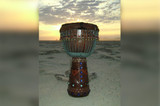Where’s the Money – Studio Drumming or Live Performance?
For anyone who wants a career in drumming and music performance, it can be a challenging arena to enter into. With the competition involved in becoming the next big star, as well as an industry that is shrinking due to less music sales overall, setting one’s sights on a career in music is a formidable goal. As a drummer, the opportunities in music performance are certainly different than those of a vocalist, and it is talent and motivation that may trump other aspects of performance that lead to a career as a popular musician. If you have the talent, and the determination to make your mark in music and rhythm, then a drumming career may be closer than you think.
For a drummer who wants to pound out rhythms each day for the sheer love of the beat, career options are not entirely limited, even in music performance. There are tons of opportunities in music, including songwriting, teaching, recording and producing. But, as any musician will say, it’s the love of sharing a musical talent that drives most music careers. The two big choices for drummers in a music performance career have not changed much over the years: live performance or studio drumming. These two areas of performance both have benefits, but as @TuteMzuka asked on Twitter, which one can make the most money for a drummer?
Berklee College of Music compiled data for a wide range of music careers in 2010, including those that fall under instrumental performance. While understanding that the wages related to these careers can be affected by level of expertise and geographic region, for an entry-level drummer, the figures are likely an accurate portrayal of most drumming performance careers. The Berklee research states that an instrumental performer can make around $75-$100 per club performance, and those with better known reputations can certainly exceed that value. When it comes to studio drumming, as a session musician, the report states there is a wide range of compensation for an instrumentalist, and the top of that range is over $100,000.

Another aspect to note, however, is that many times drumming performance and studio drumming go hand in hand, with each “job” enhancing the drummer’s skills, talent and overall reputation. This practice can most definitely lead to higher pay in both types of careers, as more studio drumming leads to more performances, and more performances lead to more studio drumming.
Recent Posts
-
What is the Best Size Djembe for Beginners?
If you're new to the world of percussion and interested in learning the djembe, you're in for a t …16th Jul 2024 -
The Benefits of Becoming a Drumming Teacher: Transforming Passion into Profession
Why become a drumming teacher? Becoming a drumming teacher is an excellent way to share your pas …22nd May 2024 -
What Makes the Djembe Drum a Spiritual Instrument in African Music?
Origin and history of the Djembe drum The Djembe drum originates from West Africa and holds sign …16th May 2024




